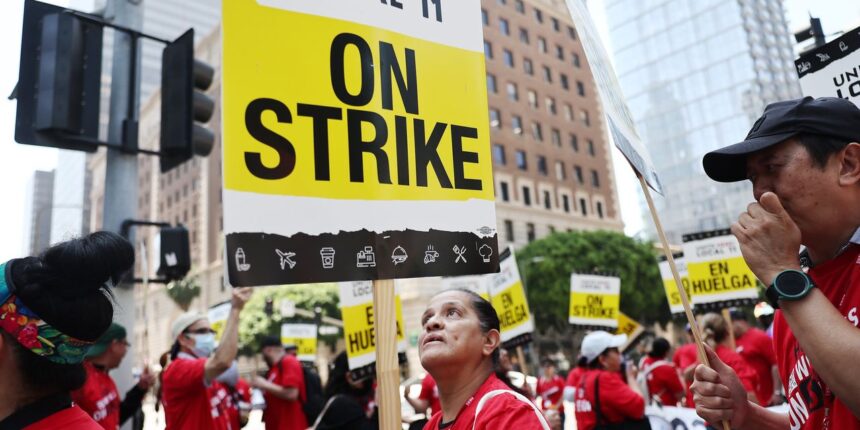Public approval of unions is at a nearly six-decade high, one poll says. More Americans sympathize with striking Hollywood actors and writers than they do with the studios, says another poll.
Yet there are reminders during this so-called summer of solidarity, as unions have dubbed it, that striking workers aren’t just battling with their employers and trying to negotiate better wages and working conditions. They can also come in direct conflict with their employers’ customers.
After all, despite what polls show about public sentiment toward workers and unions, not everyone will be sympathetic to a strike — especially if it negatively affects them. For example, a recent wedding at a California hotel had the bride and her party complaining about disruption by striking workers, who in turn accused the hotel and wedding guests of being the aggressors.
More broadly, hospitality workers in Los Angeles and elsewhere in Southern California, who have been on a rolling strike since early July, say they have been targeted by guests, the public and hotel security in several violent incidents, and have called for a boycott of three hotels because of it.
The woman who held her wedding earlier this month at one of those hotels, Hotel Maya in Long Beach, said some striking hotel workers called her puta, a Spanish word for b—; that one of the picketers kicked her cousin; and that the workers moved the site of their protest to intentionally disrupt her wedding ceremony.
Unite Here Local 11, the union representing the hotel workers, declined to comment specifically on the bride’s allegations. The union is fighting for higher wages for the workers as they struggle to afford living in a famously expensive region; better staffing levels amid a hotel-industry recovery from the coronavirus pandemic; and more.
‘The union’s job is to disrupt’
A video released Tuesday by the union from the day of the wedding shows what appears to be hotel security and some wedding guests using portions of a chain-link fence to push the striking workers off the sidewalk, where they were legally allowed to be, and a man who appeared to be a wedding guest going around the fence to hit a striking worker in the face.
The bride, Maisha Hudson, told MarketWatch she had booked her wedding at the hotel months in advance and had no idea there would be a strike there until days before the wedding. Despite her family pleading with the striking workers to let her ceremony proceed without disruption on the day of the wedding, she said, Long Beach police still had to accompany her to her ceremony on the hotel’s property.
Hudson said she encountered two of the striking workers as she made her way to her ceremony. “I asked them, ‘Can you please respect my wedding?’ One guy said, ‘Not my problem.’ The other guy said to me, ‘God bless you, ma’am.’ I lost it. I started crying.”
“‘Anytime you’re doing collective action when tons of people are involved, no matter how hard you try to stay disciplined, there’s always going to be somebody who’s going to go off message.’”
A spokesperson for the Long Beach Police Department confirmed that police “escorted the bride through the group.” The spokesperson said police are investigating after responding to the hotel that day and finding four people with non-life-threatening injuries, one of whom was treated by fire-department personnel at the scene.
A preliminary investigation “suggests the victims were part of a demonstration when they were approached by an unknown male adult suspect who destroyed [a speaker] belonging to one of the victims … and proceeded to batter the victims,” the spokesperson said, indicating that the victims were striking workers. The suspect fled the scene before officers arrived, according to police.
Hotel Maya is a Doubletree by Hilton property. A Hilton
HLT,
spokesperson said the hotel is independently owned and operated. A manager for Hotel Maya referred MarketWatch to a spokesperson, who said the hotel would not be providing interviews or any information.
There are no easy answers in these types of situations, said David Meyer, a professor of sociology at the University of California, Irvine.
“Protests and strikes are polarizing,” Meyer said in an interview. “The union’s job is to disrupt but to get people talking about the reason, which is about fairness, dignity and wages. But there are going to be other sounds there.” He mentioned the old labor song “Which Side Are You On?”
“Some people are going to be inconvenienced, and they’re going to be angry,” Meyer added.
‘The people who are stuck in the middle’
Hudson said she and many of her guests were supportive of unions and striking workers, and that she has a relative who was a union leader.
“I understand their position,” she said. “But there should also be a level of respect for the people who are stuck in the middle. … There was no need for them to walk around building calling me a b— because I had reservations there. I suffered, too, because of the level of staffing [for my wedding].”
Elsewhere in Southern California, German Martinez, an employee at Fairmont Miramar Hotel & Bungalows in Santa Monica, said hotel security tackled him to the ground earlier this month — unprovoked — as he and his colleagues tried to form a picket line outside the hotel. Martinez, a dishwasher at the hotel, also said in an interview with MarketWatch that his legs and arms were bruised, and that his knee continues to hurt because of what happened.
“It feels like the hotel management is trying to keep me and my coworkers from speaking up,” Martinez said. “It’s not fair. All I’m trying to do is trying to stand up for myself and a better contract.”
A person who answered the phone Tuesday and identified himself as the hotel operator said the general manager of the Fairmont is “not answering questions at the moment” and hung up on MarketWatch. A spokesperson for Accor
AC,
the multinational France-based hospitality company whose brands include Fairmont Hotels & Resorts, did not immediately return a request for comment.
See: Striking workers need unemployment pay — and fast, this lawmaker says
Martinez said his hourly wage after 34 years at the hotel is $25.49 an hour, which is at the high end of what the union says is the average hourly pay for hotel workers in the area. The union, which has said hospitality workers are having a tough time keeping up with the rising cost of housing in the region, is asking the hotels for an immediate raise of $5 an hour for its members, plus $3 an hour each of the next three years. The hotels are offering raises of $2.50 an hour for the first 12 months, then $6.25 an hour over four years.
At another hotel in Orange County in Southern California, Emilse Pineda, a striking housekeeper at Laguna Cliffs Marriott Dana Point, said through the union that she was punched in the head by a hotel guest while she was picketing. Pineda said hotel security did nothing about it after she reported the incident.
“We take these allegations very seriously and are investigating these claims as part of our commitment to operating welcoming and inclusive hospitality destinations,” said a spokesperson for Aimbridge Hospitality, which runs the Marriott
MAR,
hotel in Dana Point.
Earlier this month, the union also filed an unfair-labor-practice charge with the National Labor Relations Board against the hotels over the violence it says striking workers have experienced.
At the time, a spokesperson for the California Hotel & Lodging Association accused union members of “extremely aggressive and unlawful protest tactics” that include “blaring sirens and alarms at odd hours.”
Managing public perceptions of movements is difficult, Meyer said.
“Anytime you’re doing collective action when tons of people are involved, no matter how hard you try to stay disciplined, there’s always going to be somebody who’s going to go off message,” he said.
From the archives (July 2023): Actors, writers, hotel housekeepers and grad-student workers are all striking for the same reason








